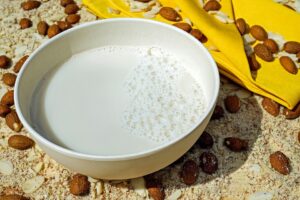
How to make your fruit and veg last longer
Do you ever wonder why your fruit and veg sometimes ends up in the bin due to spoilage just a few days after you bought it? It might be because of the way that it has been stored.
Have a look at the handy tips below to see if you could make your fruit and veg last longer.
How long and where should you store your produce?
1-3 days
Tomatoes – room temperature unless over ripe.
Fresh herbs and spinach – in an airtight bag in fridge.
Asparagus, courgettes, mushrooms and sugarsnap peas – at the bottom of fridge.
3-5 days
Apples, avocados and pears – room temperature.
Chard, French beans, kale, pak choi, rhubarb, runner beans and salad leaves – airtight bag in fridge.
Broad beans, broccoli, spring greens and sweetcorn – bottom of fridge.
1 week or more
Bananas*, citrus fruit and squash – room temperature.
Beetroot, Jerusalem artichokes, onions and potatoes – cool dry place.
Bunched onions, cabbage, carrots, cauliflower, celeriac, cucumber, fennel, leeks, parsnips, peppers, sprouts, swede – bottom of fridge.
*An important note about bananas
Bananas release ethylene gas that causes other fruits to ripen and spoil quicker, therefore store your bananas away from other fruits and without the plastic packaging. Ideally on a ‘banana tree’ hanger, on the kitchen counter away from direct sunlight, which encourages air circulation and minimises ‘bruising’. Do not store bananas in the fridge. If you want to freeze them, peel ripe bananas first and either leave whole or cut in pieces and place them into a plastic bag before freezing.
This is how I store my produce.
Quick tips:
- Eat seasonal produce*
- Plan your meals around the fruit and veg that need eating first
- Eat organic as much as you can as they are pesticide-free, taste better and have a higher nutrient content
- Make sure your fridge is at the right temperature (0-5C)
- Keep the produce in their original packaging to keep them fresh for longer
- Wash your produce before consuming or cooking, not before storing them as they carry a natural protective coating and if washed, they do not keep well
- When storing herbs, snip off the ends, store upright in a glass of water (like flowers in a vase), they last longer that way
*Seasonal produce
April to June
Asparagus
Broad beans
Bunched carrots
Cucumbers
Kohlrabi
Lettuce
New potatoes
Radish
Rhubarb
Spring onions
Strawberries
Tomatoes
Wet garlic
Wild garlic
And more…
Have you found this post helpful? If you’d like some more tips, inspiration or simple healthy recipes, have a look at my Instagram page or my blog. 😉

Source: “Riverford companion” book – by Guy Watson
 Previous Post
Previous Post Next Post
Next Post


